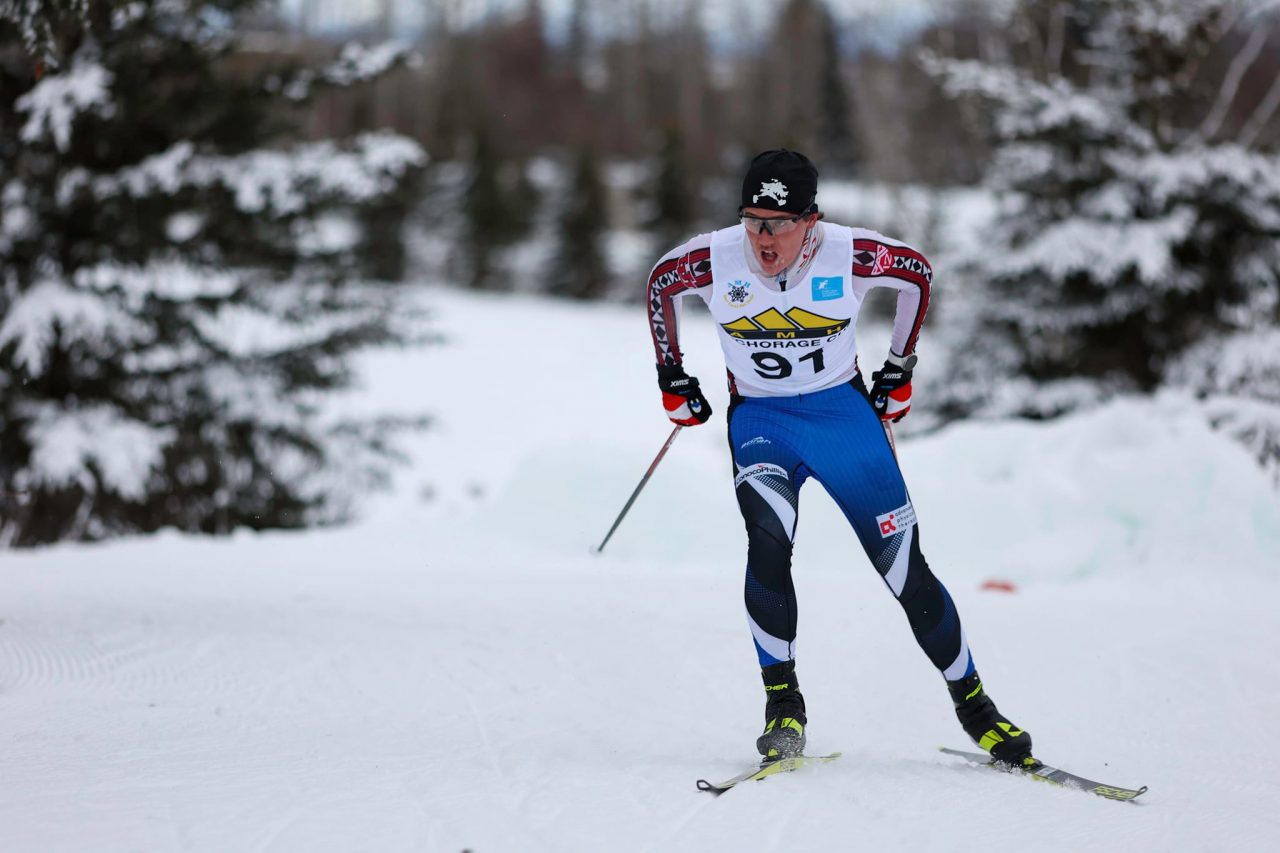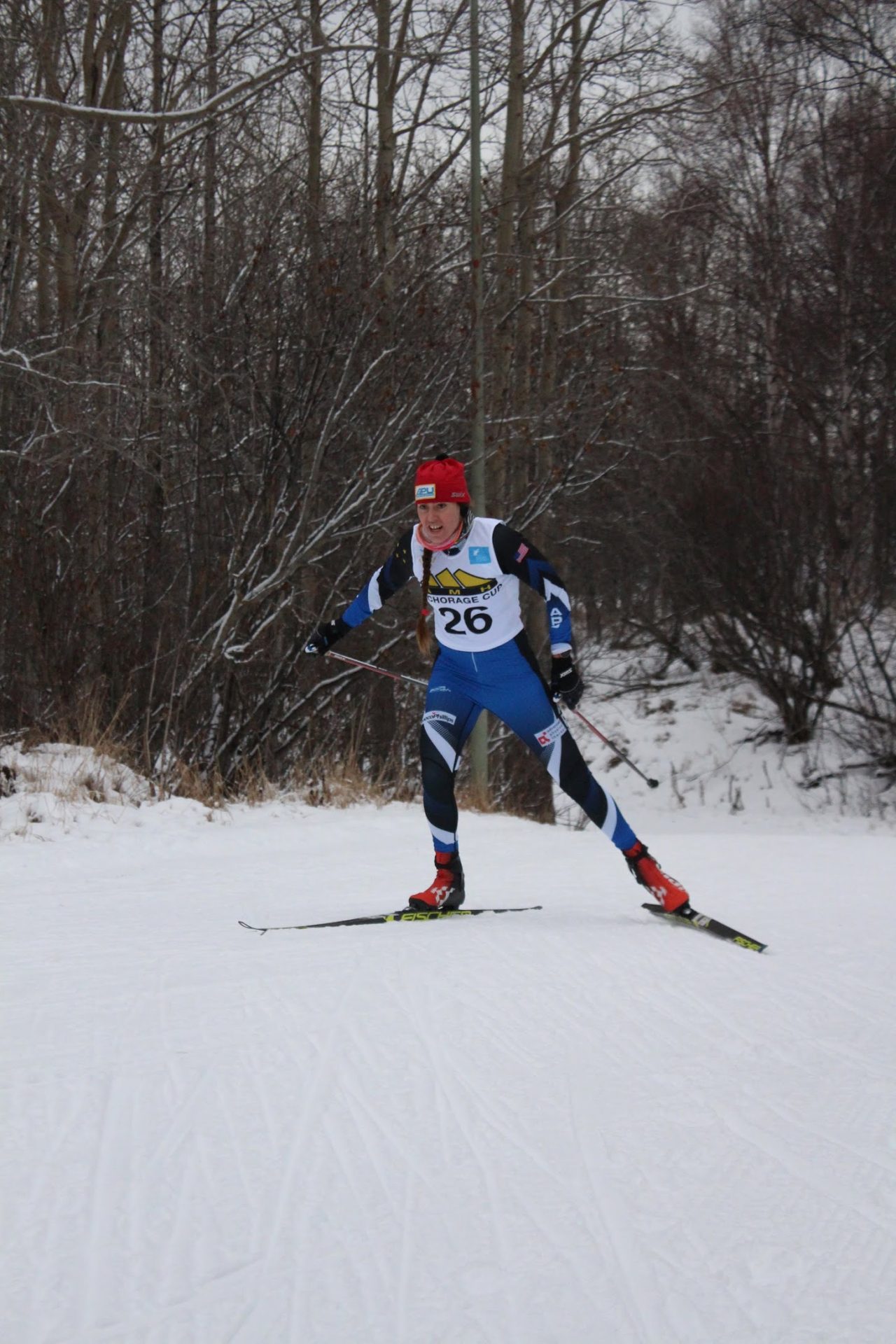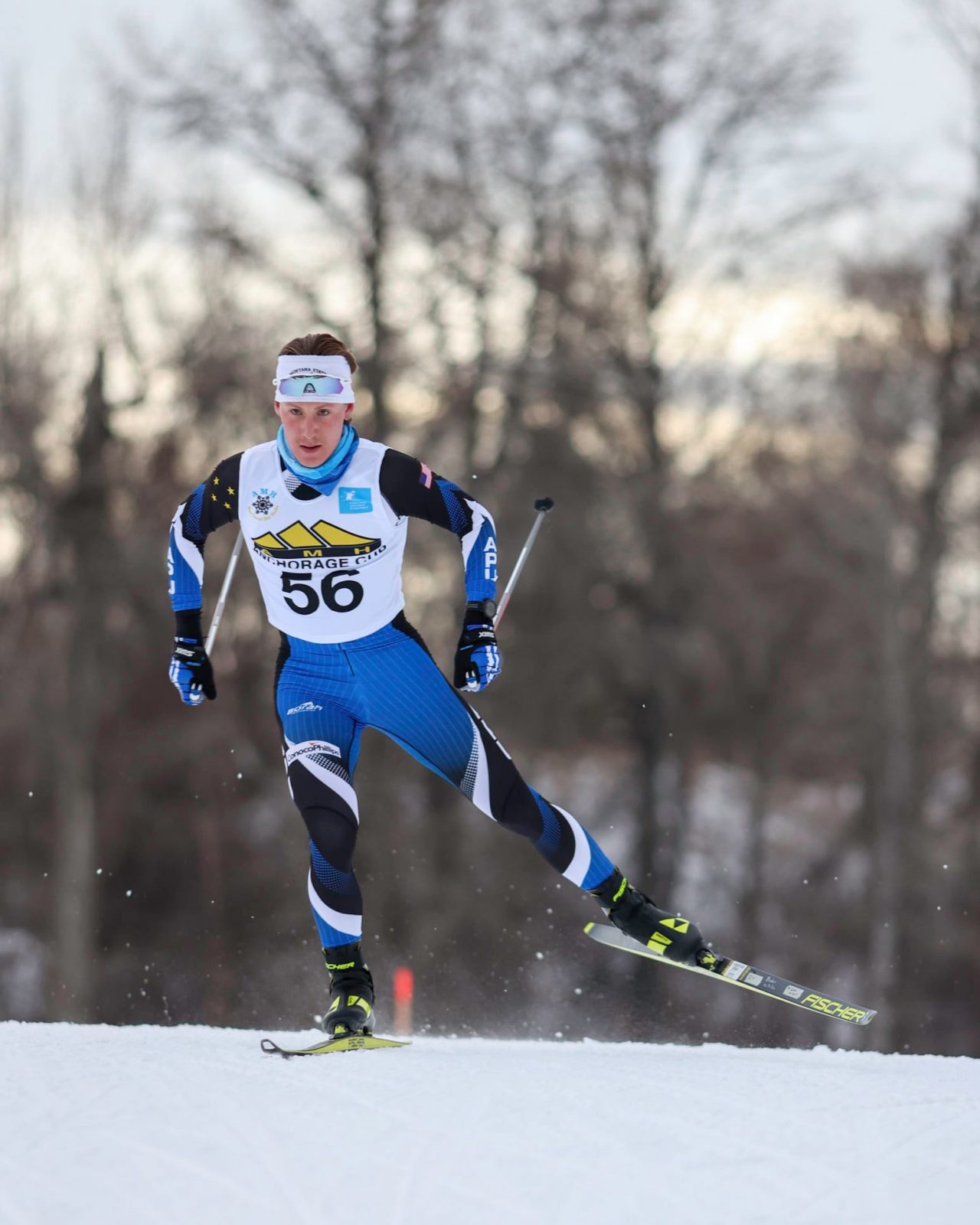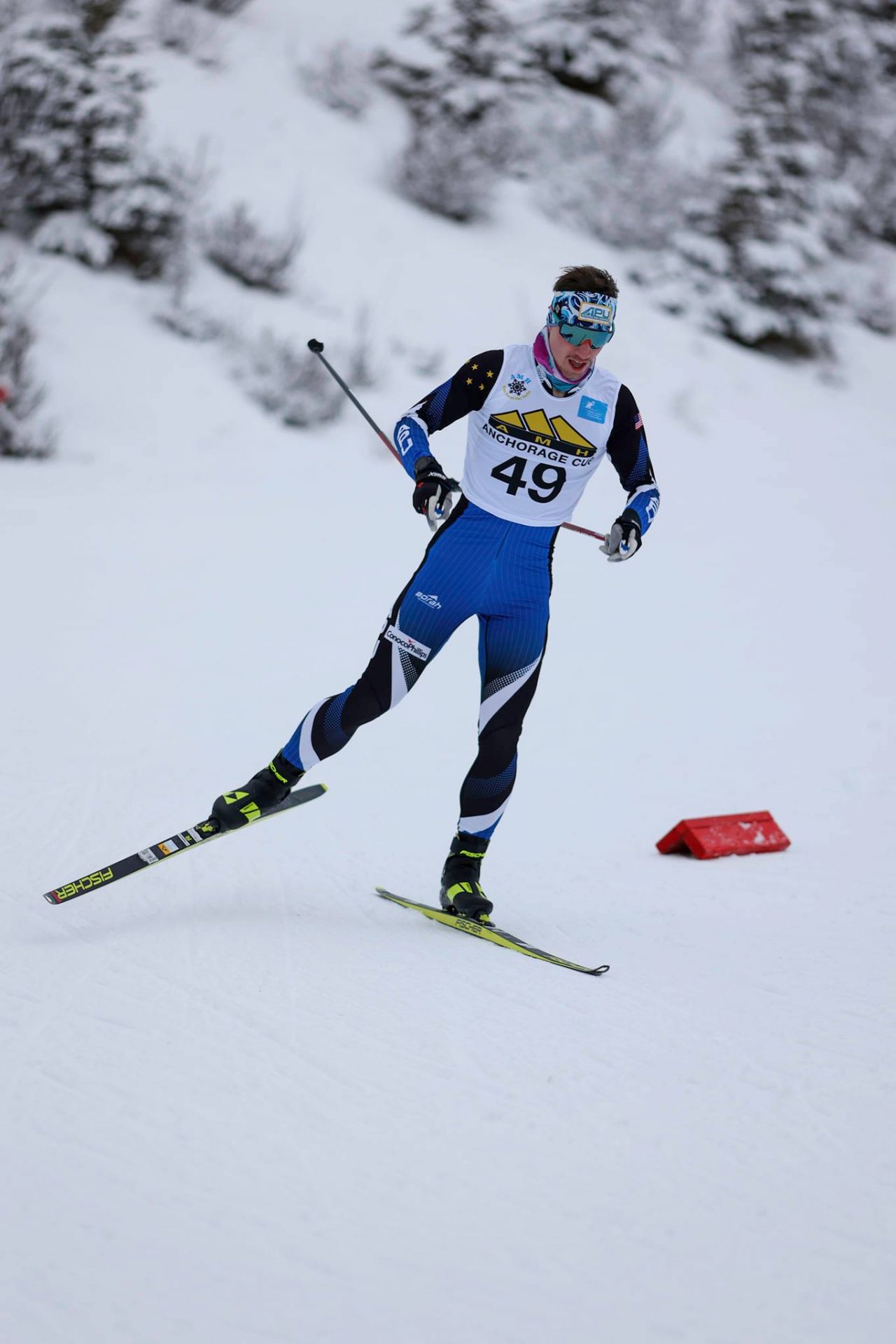
ANCHORAGE — Sadie Maubet Bjornsen, Luke Jager, and Hunter Wonders won FIS races at Kincaid Park over the weekend against strong fields, in what would typically be statewide races used for Junior Nationals qualification but were this year held as a mostly Anchorage-based weekend after a state sponsoring body declined to host. This race writeup covers Saturday’s classic sprint qualifier, which along with Sunday’s freestyle distance races were the first FIS races held on this continent this season. A separate article, later this month, will examine some of the logistical and public health issues involved in hosting high-level ski races during a pandemic.
Classic sprint qualifier
Senior Nationals in Houghton, Michigan, were cancelled this year, but Saturday’s conditions ensured that Alaska skiers nonetheless got something approximating the full Houghton experience: It was 15° F when the races started, with winds gusting above 25mph, probably more in the exposed Kincaid stadium. It snowed at least 8” in Anchorage on Sunday.

Women and men both raced the same course that was used for the women’s sprint races at 2018 Senior Nationals. In 2018, APU skier Becca Rorabaugh clocked a 3:42.71 to set the top American time for classic sprint qualification. On Saturday, over the same course, Rorabaugh was over a minute slower; she afterwards wrote on Instagram, self-effacingly but not inaccurately, that it looked like she was skiing a 5 k. Her APU teammate Rosie Frankowski on Saturday was 54 seconds off the pace that she had set in those championships. It was a slow day out there.
Women’s race
The conditions may have slowed down Sadie Maubet Bjornsen (USST/APU) – Saturday’s race was likely the slowest sprint qualifier of her career as a senior athlete – but they had much less of an effect on her than on anyone else in the field. Wearing a massive face shield that covered half her head, plowing through fresh snow that accumulated in the tracks ahead of her as the first starter in the women’s field, single-use Tyvek bib flapping in the wind, Maubet Bjornsen stopped the clock in 4:17.88 after her first trip around the new Kincaid sprint course in race conditions. She posted the day’s fastest time by nearly 30 seconds.
Maubet Bjornsen exulted in racing in such conditions. “I have to be honest, a lot of the racing we do in Europe, it’s on manmade snow,” Maubet Bjornsen told a local television station after the race. “So I’ve had so much fun racing in Alaska this last month on real snow, real snowstorms, the real cross-country skiing.”
She expressed similar sentiments to FasterSkier. Addressing both her race and her decision to stay home for the start of this season, Maubet Bjornsen wrote, “It was super fun to spend some time racing at home, and incorporate the racing in with life. I still feel super happy with the plan I have made for myself this winter! I have gotten to spend more time than ever with my husband, I have gotten to chase another dream beside skiing (CPA studies), I will get to spend the holidays with my family, and I think I’m more fit than ever. For sure I feel happier than ever, so I know I made the right choice. My goals are in February/March – and I feel mentally and physically on track for that!”

Taking second place on the day was Maubet Bjornsen’s APU teammate Rosie Frankowski (+24.40), who is not traditionally known as a sprinter but who nonetheless made the classic sprint final on a blustery day in Houghton at 2020 Senior Nationals. (Frankowski’s qualification time on that 1.5-kilometer course was six seconds faster than her time on Saturday, implying that Anchorage saw even slower conditions.) Mariel Pulles (+24.94), who skis domestically for University of Alaska Fairbanks and internationally for Estonia, rounded out the podium. Pulles was the only non-APU skier to claim a podium spot all weekend.
“I was pleasantly surprised to see myself in 2nd in the sprint qualifier behind Sadie,” Frankowski wrote to FasterSkier, “although we are talking a looooonnnngggg way behind so I am not thinking of switching to focusing on sprinting or anything crazy like that haha!”
Frankowski, who like Laura Ingalls Wilder grew up in the Midwest, added, “The most eventful part of Saturday’s race was how snowy and windy it was. It truly was like racing in a blizzard on the prairie of the Great Plains where you need a rope to find your barn!”
The rest of the top ten was: Becca Rorabaugh (APU, +30.22) in fourth; Kendall Kramer (UAF, +31.97) in fifth; Garviey Tobin (APU, +41.77) in sixth; Tuva Granoeien (UAA, +43.86) in seventh; Marit Flora (APU, +44.02) in eighth; Meredith Schwartz (Alaska Winter Stars, or AWS, +46.18), a U18 athlete, in ninth; and Alison Arians (AWS, +47.31), an M5 athlete and Schwartz’s mother, in tenth.
Everyone after Tobin, in a strong U18+ field, finished the 1.5-km sprint qualifier in over 5 minutes. It was a slow day out there.
The top three U18 girls were Marit Flora (APU), Meredith Schwartz (AWS), and Quincy Donley (AWS).
The top three U16 girls, who skied a 1.2-kilometer course, were Sammy Legate, Heidi Schumacher, and Madeleine Reckmeyer. All three athletes ski for Alaska Winter Stars.

Men’s race
On the men’s side, Luke Jager, as the first starter of the day, had a similar experience to his APU teammate Maubet Bjornsen: Plow through fresh snow; ski more slowly than he was accustomed to; nonetheless take the win.
At 2018 Nationals, Jager, at the time 17 years old, covered the full 1.6-kilometer classic sprint course in 3:37.61 in qualification, placing 29th to become one of three juniors to sneak into the heats. On Saturday, Jager, now 20, covered a shorter course in 3:42.81. And won.
The race “was pretty good!” Jager wrote to FasterSkier on Saturday. “Definitely felt like I was missing a couple of gears out there still and was nervous about having to go first in the falling snow but happy I was able to execute the best I could despite that and that it worked out.”
Regarding his racing and training plans in this atypical year, Jager noted, “Definitely have been training quite a bit more in the past couple months than usual to try and put myself in a good place for hopefully U23s/any other opportunities I get past that. It’s been kind of hard balancing being in the best shape I can be for the few ‘qualifying’ races we have while also trying to build some fatigue and a good base to have success in February and after that. But I think I’m doing a pretty good job balancing base building and race tuning and today was a nice confidence builder that I am in a good place that is hopefully just gonna get a lot better as the season goes on.”
Jager added profuse thanks for the host club, Nordic Skiing Association of Anchorage, and the volunteers who stood outside in the notoriously windy Kincaid stadium for hours on a blustery day: “Very thankful that we live in a place that prioritizes skiing and being outside and have such dedicated volunteers that care enough to make races happen when it is really not easy at all.”

The top of the men’s field was much tighter than the women’s field; the presence of a multi-time World Cup podium finisher has a way of skewing the curve. Jager was “only” 3.22 seconds ahead of his APU teammate Zanden McMullen (who won last weekend’s citizens race 10 k skate over largely the same field), and 5.83 seconds ahead of his APU teammate Hunter Wonders.
The rest of the top ten was: Thomas O’Harra (APU, +6.74) in fourth; Michael Earnhart (APU, +10.12) in fifth; Sam Hendry (University of Utah, +10.31) in sixth; Forrest Mahlen (APU, +11.94) in seventh; Kai Meyers (APU, +12.03) in eighth; Joel Power (AWS, +13.84) in ninth; and Mike Ophoff (UAF, +14.43) in tenth.
The top three U18 boys were Aaron Power (AWS), Aaron Maves (AWS), and Porter Blei (Alaska Nordic Racing, or ANR).
The top three U16 boys over a 1.2-km course, again all from Alaska Winter Stars, were Elias Soule, Owen Young, and Paul Hlasny.

This year’s sprint race was a qualifier only, no heats, for obvious, Covid-related reasons: Athletes starting at 30-second intervals should remain a reasonable distance apart over a single trip around a 1.5-kilometer sprint course, assuming a sensible seeding system. (Saturday’s race was seeded off a combination of FIS and USSS points for those athletes who had them, with the fastest athletes starting first (“reverse seeding”). Comparing bib numbers and finish places on the results sheet suggests that some athletes near the back of each field overtook each other on the course, but not too many.) By contrast, there is no easy way to keep athletes separate during head-to-head racing in sprint heats; heats therefore did not occur.
While the change was instituted for public health reasons, it had the salutary side effect of avoiding the traditional winter-solstice-in-Anchorage experience of starting the first qualifier shortly after sunrise, and running the last heat under the lights some time after sunset.
For readers of a certain age, the qual-only event hearkened back to the skate sprint at 2017 U.S. Nationals (when the schedule of an elementary school located at the Soldier Hollow venue prevented use of the trails for a full sprint day), or even to the short-lived SuperTour qualifier-only era, ca. 2009–2012. Presumably, the no-heats format will be present this season, but not into the future as, hopefully, health concerns subside; whoever authored this fine rant on JohnnyKlister can rest easy.
Results: Classic sprint qualifier
Gavin Kentch
Gavin Kentch wrote for FasterSkier from 2016–2022. He has a cat named Marit.
